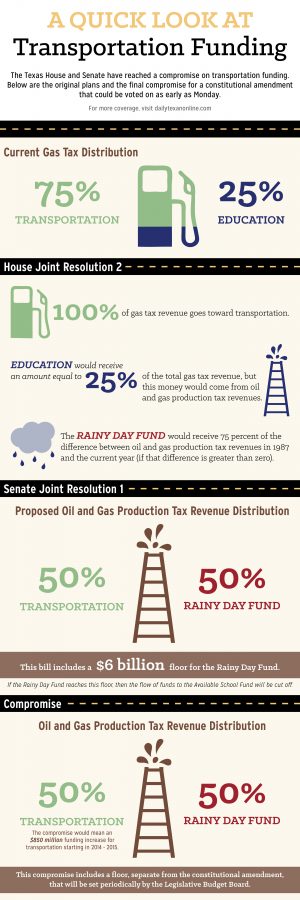Congratulations may be in order for the Texas Legislature for finally sealing up this session’s last official item of business: transportation funding. While nothing is set in stone yet, on Friday negotiators from the House and Senate declared a break in the impasse that had temporarily grounded the much-needed legislation to a halt.
The compromise contains a healthy mix of elements from House Joint Resolution 2 and Senate Joint Resolution 1 that the Legislature should pass as soon as possible. From SJR 1, the compromise will take a funding mechanism, expected to generate $850 million for transportation, that diverts half of all future oil and gas production taxes to the highway fund (which would otherwise have gone to the rainy day fund, a fund for state economic emergencies). To the House it concedes a statutory, rather than constitutional, minimum for the rainy day fund below which its reserves could not fall.
As a constitutional amendment, the plan will require a two-thirds vote of both the House and Senate to advance to voters in November 2014.
The floor, as the minimum amount allowed in the rainy day fund is being called, would give the Legislative Budget Board the authority to adjust the limit as it saw fit.
We applaud the negotiators for agreeing to a floor for the rainy day fund.
While some legislators fear that such a baseline would crimp the state’s flexibility in times of need, we fear what would happen if oil and gas prices plummeted again like they did in the ‘80s. That may seem unlikely now given the plethora of news stories, such as the ones this paper ran in April in a special edition of the Texan, that focus on the booming economies of oil towns in West Texas, but as Dermot Gately, an economics professor at New York University, has written, the 1986 oil price collapse that crippled the Texas economy took most analysts by surprise.
The Texas Department of Transportation says it needs $4 billion more a year to maintain current levels of congestion. While the current compromise would only cover around 20 percent of that, it is a good first step on the road toward solving Texas’ transportation problems. With Gov. Rick Perry promising to call a third special session if the Legislature doesn’t approve a measure by the end of the special session Tuesday, it is imperative that legislators make one last push in the next two days to keep Texas moving. We don’t need any more traffic jams in the 83rd session.
















